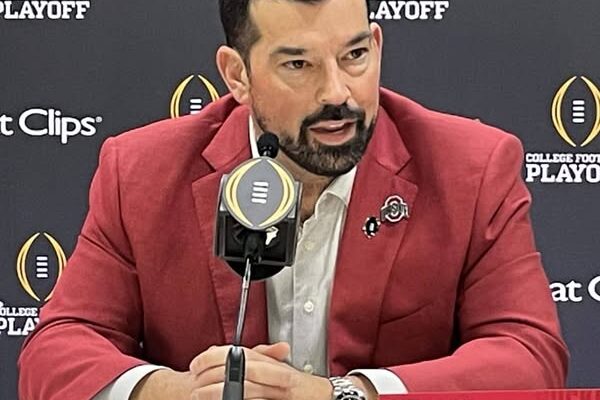ESPN REPORT: WHO ELSE IF NOT RYAN DAY? College football is rocked by controversy after ESPN’s Bill Connelly named Ryan Day, the head coach of Ohio State, the top college football coach. Tennessee, Notre Dame, Georgia, and other elite programs sulked and
College football fans are no strangers to controversy. Every year, debates rage about rankings, playoff berths, recruiting battles, and, perhaps most hotly contested of all, coaching supremacy. So when ESPN’s Bill Connelly recently released his updated ranking of college football head coaches and placed Ohio State’s Ryan Day at the very top, the reaction was seismic. Fans and pundits from coast to coast weighed in, with many backing the choice and others crying foul. In an era where coaching pedigree, consistency, innovation, and national titles are weighed like gold, Connelly’s assertion drew fire from every corner of the college football universe. But the real question remains: who else, if not Ryan Day?
On the surface, naming Ryan Day the top college football coach may strike some as premature or even provocative. After all, Day has yet to win a national championship, a milestone many view as essential in any GOAT conversation. But dig deeper, and the rationale begins to take shape. Since taking over the Ohio State program from Urban Meyer in 2019, Day has compiled an enviable record. He has maintained, and in many ways elevated, the Buckeyes’ offensive firepower, recruited with ruthless efficiency, and kept Ohio State firmly in the national title conversation every season. His regular-season record is sparkling. He’s 56–8 overall as of 2024, with most of those losses coming in postseason or high-stakes matchups against elite opponents. In terms of win percentage, consistency, and competitiveness, Day is elite.
Still, detractors abound, and their criticism rests on tangible grievances. His inability to defeat Michigan in three straight years—before winning convincingly in 2024—created a shadow over his tenure. In a rivalry where records mean less than that single game at season’s end, Day’s early struggles raised eyebrows. And while Ohio State made the College Football Playoff multiple times under his leadership, each appearance ended in disappointment. To critics, these are not small blemishes; they’re glaring red flags for a coach seeking to be crowned the best in the game.
But again, the central question persists: if not Ryan Day, then who?
Georgia’s Kirby Smart, the reigning titan of the SEC, is a logical candidate. He has two national championships, an NFL pipeline that runs deeper than the Chattahoochee, and a defense-first identity that has bludgeoned opponents into submission. His Bulldogs have become the new Alabama in many ways, embodying a machine-like dominance. But even Smart had a hiccup in 2023 when Georgia failed to make the playoff, and in the parity-rich SEC, nothing is ever guaranteed. Some argue that Smart inherited many of the institutional advantages that come with coaching in Athens: fertile recruiting grounds, massive booster backing, and a post-Saban vacuum that Georgia was poised to fill. While none of that diminishes his results, critics argue it places his accomplishments in context rather than in isolation.
Then there’s Nick Saban, whose retirement following the 2023 season left a power vacuum in the sport. If this list were historical, the answer would be simple: Saban. But in a post-Saban world, naming someone else the best is inevitable. Even in his final years, Saban saw chinks in the armor—an increasing struggle to dominate NIL recruiting battles and a tactical rigidity that sometimes fell behind newer offensive trends. He remains the standard, but the sport moves forward.
Turning elsewhere, names like Brian Kelly at LSU and Marcus Freeman at Notre Dame enter the conversation. Kelly has a track record of winning—at Cincinnati, Notre Dame, and now LSU. But like Day, he lacks a national title, and his teams often wilt in the biggest moments. His demeanor and public perception don’t help his case either; fans don’t flock to his banner in the same way they do with more charismatic or culturally beloved coaches.
Freeman, still in the early chapters of his head coaching career, shows promise, but promise isn’t the same as dominance. Notre Dame continues to flirt with greatness under his watch but hasn’t yet made the leap. Freeman’s recruiting acumen and defensive mind are undeniable assets, yet his lack of playoff appearances and marquee wins put him a tier below—for now.
Clemson’s Dabo Swinney once stood atop the coaching mountain with two national titles and a program that dethroned Alabama multiple times. But Clemson’s recent decline, coupled with Swinney’s outspoken resistance to NIL and the transfer portal, has made his program feel outdated. In a sport that demands adaptability, Swinney seems locked in a past era. Once the future, he now feels more like the resistance.
What about Josh Heupel at Tennessee? He turned around a dormant program, infused it with energy and offensive innovation, and delivered marquee wins over Alabama and Florida. Yet consistency remains elusive in Knoxville. Tennessee has yet to make a playoff appearance under Heupel, and despite thrilling moments, the program still feels more dangerous than dominant. Heupel’s offensive mind is sharp, and his ability to develop quarterbacks is proven, but Tennessee’s overall infrastructure and track record haven’t caught up with his ambitions.
James Franklin at Penn State is another curious case. Few coaches can claim Franklin’s consistency in fielding top-10 teams, and his recruiting has quietly climbed into the upper echelon. Still, Franklin has just two wins against Ohio State and Michigan combined since arriving in Happy Valley. His teams often fall just short of elite, making him a perennial “almost” rather than a “definitely.”
Jim Harbaugh, of course, would’ve been a top candidate if not for his jump to the NFL following Michigan’s 2023 national title. Harbaugh exorcised his own demons, finally beating Ohio State multiple times and winning it all before departing for the Los Angeles Chargers. His success in Ann Arbor reshaped his legacy, but he is no longer in the college ranks, and thus out of the equation—at least for now.
Lincoln Riley at USC has the offensive mind and quarterback development résumé that few can match. But questions about defensive competence and postseason underachievement continue to follow him. In both Oklahoma and USC, Riley has delivered thrilling games and Heisman winners, but no playoff wins. His programs often feel like Ferrari engines with bicycle brakes—flashy, powerful, but unable to stop elite opponents when it matters.
So we return, full circle, to Ryan Day. His résumé, albeit still lacking that crowning national championship, may actually represent the perfect balance of modern coaching strengths. He blends elite recruiting with advanced offensive scheming. He adapts to new trends, embraces the transfer portal, and works within the modern NIL framework rather than resisting it. He’s also shown growth in his leadership style. Day’s early struggles in rivalry games—especially against Michigan—became focal points of criticism, but his 2024 redemption changed the narrative.
It’s also crucial to remember the context in which Day operates. At Ohio State, expectations are sky-high. An 11–2 season is considered a failure. Any loss to Michigan is grounds for an existential crisis. The pressure cooker is unlike nearly any other program in the country. And despite that, Day has not only survived, but thrived. He’s delivered top-five recruiting classes year after year, kept the Buckeyes in the playoff race every season, and developed NFL-ready quarterbacks with startling regularity.
What Day hasn’t done yet, many argue, is “win the big one.” And perhaps that’s what makes this debate so charged. If Ryan Day had a national title in his back pocket, this ranking might’ve gone down smoothly. But Connelly’s assertion is not about the past as much as it is about the present—and the immediate future. Day, right now, might be the most complete head coach in college football, balancing tradition with innovation, discipline with flexibility, and pressure with performance.
College football is, at its heart, a passionate sport driven by regional pride, deep-rooted traditions, and endless speculation. Lists like Connelly’s aren’t gospel—they’re conversation starters. They ignite barroom debates, radio call-ins, and Twitter wars. They make fans from Knoxville to South Bend to Athens ask, “Why not our guy?” But in this current moment, with Nick Saban retired, Dabo declining, Harbaugh gone, and Kirby mortal, Ryan Day represents something rare: stability, adaptability, and enduring relevance at the highest level. He may not be the unanimous No. 1 coach in the country, but he just might be the best answer to the question that haunts every other program.
Because if not Ryan Day—who?



